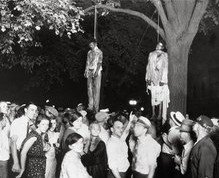The Lynch Mob Meme

Part One in a Series
A Moral Prolegomenon:
In August of 2003, ago I car-pooled with a friend of mine from Virginia to Manhattan, and we used the long ride to discuss some things in-depth, as has long been our vaguely academic habit. He is a social psychologist, and so I sometimes sound him on matters pertinent to his field. At one point I quoted the social observer Cintra Wilson on the grotesqueries of Las Vegas, “I find it to be generally true that the people with the most hateful, inhumane, intolerant politics are suckers for the most obscene forms of guileless sentimental exploitation….” He’d studied bigotry and I wondered if there had ever been any studies done on a link between sentimentality and intolerance. He gave me a very professional answer, something about how difficult it would be to define sentimentality and intolerance, let alone to map their overlap. But he liked Wilson’s notion and found it aphoristically apt. We kicked around examples: the Confederate’s mania for Sir Walter Scott; Gestapo thugs going all weepy over Lily Marlene; sociopathic shit-kickers addicted to the bathetic tableaux of Country-Western music. Not surprisingly, the talk turned to the fans of George Bush and their mania for yellow ribbons, flag-magnets, and liberators being greeted with flowers. My friend, a self-described Rockefeller Republican, interrupted my satirical fulminations to ask a question that has vexed me ever since, “Do you think George Bush is evil?” I must admit to having disliked W, almost from my first glimpse of him, but my answer on that day was a qualified “no”. Still, it’s a serious question, although borderline nonsensical too, not at all “academic,” and it demands returning to and very careful consideration.
Precisely because George W. Bush has so often brought the subject up, it’s well worth considering W. and his problem with “evil.” In fact, he has no business talking about evil – not because he’s no saint, and so lacks moral authority, but because he lacks the subjective qualifications. Many might object that evil is within the mental capacities of even the simplest folk, but there they are confused. Right and wrong are fairly commonsensical, and though sometimes difficult to discern in particular situations, they are usually discernable by most. Evil is a very different phenomenon. A rough distinction may be helpful: we often do wrong in service of our appetites or dereliction of our duties, and we may commit horrific acts in the thrall of psychopathology, but we usually descend to evil when we strike out, and especially when we induce others to strike out, against evil itself.
Evil is one of those very essential but difficult categories which mediate consciousness and the world. These categories are essential to meaning, to understanding reality, but they are not, independent of consciousness, forces in the world, or objectively real. Analogous are concepts like: truth, love, and luck. Indispensable as they may be, it is error to personify or reify them. This is a truth that’s very hard to remember, and in innumerable ways we constantly backslide into atavistic idolatries, when we forget this difficult lesson. Exemplary is one of the most dangerous things we can do, precisely what George W. Bush prides himself on doing, concluding simply, ‘I know Evil when I see it.’ This is always error for we never really see it; at best we postulate it. To the extent that we reify evil, we become its midwives into the world, the agents of what was more properly damned to mere potentiality. W and his cronies want to advance the notion of an Intelligent Designer behind evolution, but the operation of an Evil Genius sometimes seems more plausible from observed cases. Indeed, the way evil seems to gain force whenever we try to fight it with force seems diabolical.

0 Comments:
Post a Comment
<< Home